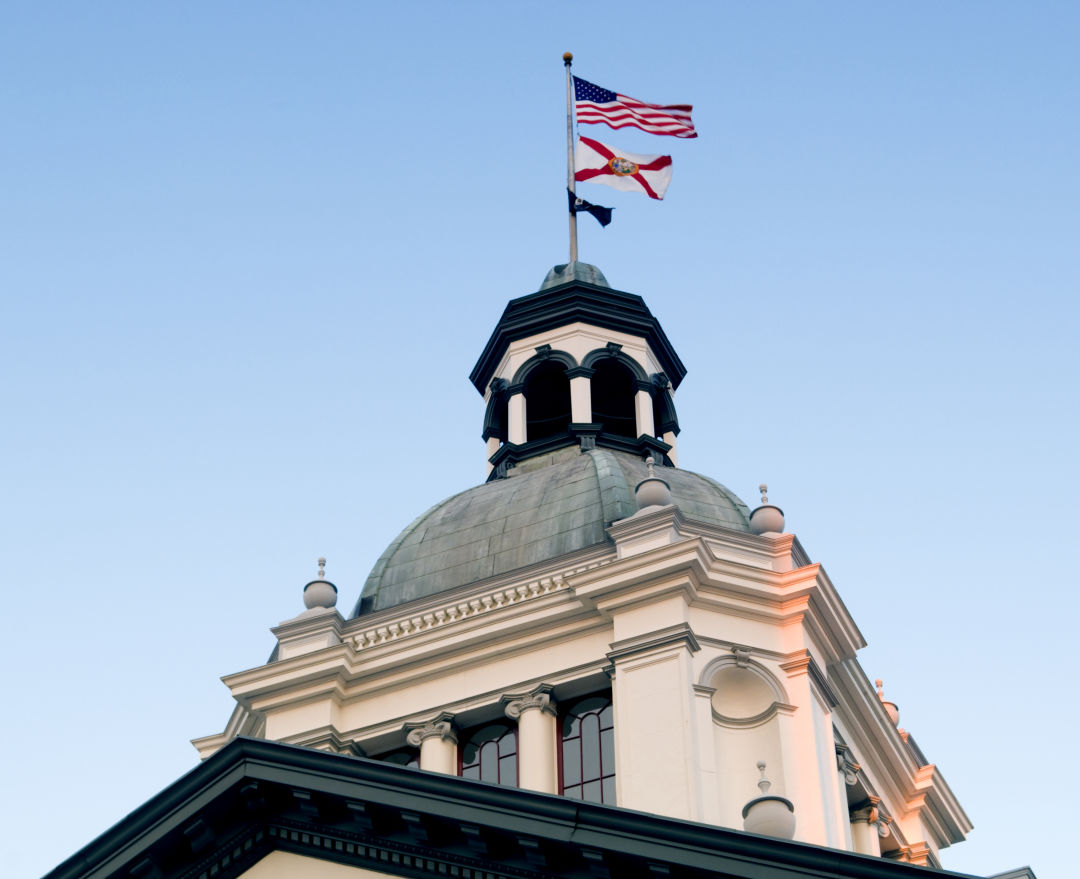Legislative Preview: What to Watch for as Lawmakers Meet in March

The Florida Capitol building
Last March, Florida legislators optimistically approved a $93-billion budget for the 2020-2021 fiscal year just as Covid-19 numbers began to tick up. At the time, the pandemic was a quiet enemy. But as numbers steadily rose and the state shut down, it became clear that this was not a passing phenomenon. Florida faces a $5.4 billion deficit over the next two years.
GOP priorities will be dominant. The Florida Legislature, already Republican controlled, turned increasingly red after this year’s election, with Republicans flipping multiple seats in the House and Senate. Sarasota and Manatee’s respective delegations will now have only one Democrat among them, House District 70’s State Rep. Michele Rayner, filling the seat most recently held by Wengay Newton. And the District 72 spot that Margaret Good famously flipped in 2018 has now gone red with newly elected Fiona McFarland.
Here are the five issues we’re watching this session.
Cuts, Cuts, Cuts
For the 2020-2021 fiscal year, general revenue is forecast to be down by $3.4 billion, on top of the $1.9 billion loss from the previous fiscal period. The bulk of that loss comes from sales tax revenue, where Florida generates much of its public funds. For our current fiscal year, sales tax revenue was estimated to be down by nearly $2.84 billion from estimates.
Regardless of political party, local legislators agree that cuts will be necessary. The question is how to go about it. Should there be across-the-board cost-cutting or cuts to particular projects? Rep. Tommy Gregory, R-Sarasota, whose district spans Manatee and Sarasota counties, falls squarely in the camp that everybody will need to make hard decisions.
“What you will see hopefully is legislators on both sides of the aisle do their part to help the state by making tough calls in their districts,” Gregory says. “This may be a year where there are few, if any, local appropriations bills.”
Covid-19 Relief
Each year’s legislative delegation meeting tends to have a theme. Last year, it was red tide. This year, State Rep. Will Robinson, R-Bradenton, says it will be residents and businesses seeking relief due to the pandemic. That could range from individuals seeking unemployment relief to small businesses struggling to stay afloat to community members who need support due to the health effects of the virus.
How the legislature will seek to alleviate these issues remains to be seen. “The pandemic has impacted every aspect of our lives here in our state—the economy, jobs, education, quality of life,” says State Rep. Ben Diamond, D-St. Petersburg. “We’ve got to provide relief and make progress to get the virus under control, or we can’t make progress on any other issue.”
Climate Change Action
There was a time in Florida when climate change was viewed as off-limits to Republicans. After all, it was under former Gov. Rick Scott that Florida Department of Environmental Protection officials were banned from using the terms “climate change” and “global warming” in official state documents.
But Gov. Ron DeSantis—viewed as a potential 2024 presidential candidate—has positioned himself as a champion of the environment. He hired a chief resilience officer shortly after taking office. He secured additional federal funding to preserve the Everglades. He issued an executive order on water quality.
His actions have opened the door for a Republican-dominated Legislature more supportive of environmental legislation and climate change resiliency. In a widely circulated op-ed, incoming Florida House Speaker Chris Sprowls and Senate President Wilton Simpson wrote of their desire to take statewide action on sea level rise and coastal flooding. In the past, local governments have had to act on climate change in the absence of state leadership but, this year, things might change.
Support of Law Enforcement
In the wake of protests after George Floyd’s Memorial Day killing by police, “Defund the police” became common parlance in activist circles. Even though protests in Florida were largely peaceful, DeSantis proposed legislation in September that would make violent assemblies, obstructing roadways and destroying or toppling monuments second- and third-degree felonies. The legislation would also not hold a driver liable if they were to injure or kill a protester while “fleeing for safety from a mob.” This will be a big topic on the table this session.
ocal Republican legislators had varying takes on the bill. Gregory said he was a big fan, but Robinson urged caution. “I’m all for fully funding law enforcement,” he says, “but I certainly don’t want to put laws on the books that inhibit someone’s ability to peacefully protest and their right under our Constitution.”
Toll Roads or No Toll Roads?
One of the big questions for this year’s legislative session will center on the three toll roads championed by former Senate President, Manatee County’s Bill Galvano. Will they get built now that Galvano has left office?
The three toll roads span different areas of the state, from Citrus County to Jefferson County near the Panhandle, from the Florida Turnpike to the Suncoast Highway near central Florida and from Polk County to Collier County farther south. Proponents say Florida’s growing population and traffic congestion make them a necessity. Environmentalists say they will encroach on land for wildlife. Public comments have been against them. Even the task forces assigned to study the roads are not sure whether they are needed.
One thing’s for certain: These toll roads will face steep opposition if they do get the green light.



